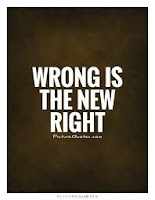Do Right and Wrong actually Exist?
 |
| Google Image |
The
case has produced a ton of publicity, partly because Weinstein has been
denounced by several high-profile movie stars, and has been roundly criticized
by people in and out of the movie industry. The case has been major fuel for
the #metoo movement.
I
would guess that Weinstein, who has pleaded not guilty, is unusual in drawing
criticism from the left and right, from Democrats, Republicans and Independents,
and everybody in between. We all think his actions, if proven, are despicable,
another case of the crass abuse of power.
But
perhaps few of us have thought about why his alleged actions are contemptible. “They
just are,” we might say. And that brings us to the subject of how to tell right
from wrong, which itself may provoke the response from some readers that “We
just know.”
Simply a Matter of Opinion?
I
wrote a blog about this topic a few years ago, promising to return to the subject,
and I think it’s time to write about it again because apart from those who
think the answer to questions of right and wrong are easy, there are evidently
more people than ever who think that right and wrong is simply a matter of
opinion.
Their
view is described as “moral relativism,” the notion that there are no objective
moral standards.
We
make routine right-and-wrong decisions every day, choices such as whether to
return money we’re overpaid in a checkout line, whether to let someone know
when we’ve dinged their car, whether to help a friend, and these decisions may
be relatively easy and seem intuitive.
And
I believe most people - young or old, aware of it or not – are guided by the
objective moral standards they learned at home and/or by the faith they may no
longer profess. We may not give them much thought, but the principles that
guide us are based on objective standards inculcated in most of us from the
Judeo-Christian tradition.
 |
| Google Image |
The
bigger moral and ethical questions, of course, are more challenging and it’s
generally those that evoke the controversy about objective standards of right
and wrong. They’re issues like abortion,
assisted suicide, same-sex marriage, the death penalty, the use of military
drones, etc. The solutions to these problems are not obvious, at least they
shouldn’t be. With good reason, rational and moral people have differing views
on these subjects.
Does
that mean that these disagreeing people are not guided by objective standards? Not
necessarily because we can disagree about how the standards are applied or
which standards are applicable. The important thing is to agree that there are
standards.
Looking
at the question from the point of view of a religious tradition makes it easier
to answer moral questions, of course. Moral standards are embedded in the
traditions of Christians, Jews and Muslims and many other religions, even
though followers of these religions often fail to follow them.
But
apart from religion, it is obvious to many of us that there are standards,
though not always explicit or exact, that are discernable by all reasonable
people. Indeed, most people share a view of what’s right and wrong. Most people,
for instance, believe that lying, cheating, stealing and hurting others is
wrong, even though they may not be able to explain why. Many of us believe
that’s because an elementary moral code “is written on our hearts.”
"Self-Evident"
Indeed,
the writers of the Declaration of Independence held this view, declaring that
certain truths are “self-evident,” and aren’t subject to the whims of
government leaders or anyone else. And it was the basis of the famous Nuremburg
trials that condemned Nazi leaders who rejected their consciences, claiming
they were merely following the law or orders in murdering millions of Jews and
others.
The
idea of such a “natural law” is an ancient one, expressed by the Greek
philosophers who, according to Wikipedia, asserted “that certain rights are
inherent by virtue of human nature, endowed by nature - traditionally by God or
a transcendent source - and that these can be understood universally through
human reason.”
If
as a society we abandon the idea of objective moral standards, we’re in big
trouble. There would be no basis for condemning lying, cheating, stealing or
hurting others or criticism of people like Harvey Weinstein. We may disagree on
how to apply them, but we must agree that right and wrong do, indeed, exist.



Comments
Post a Comment